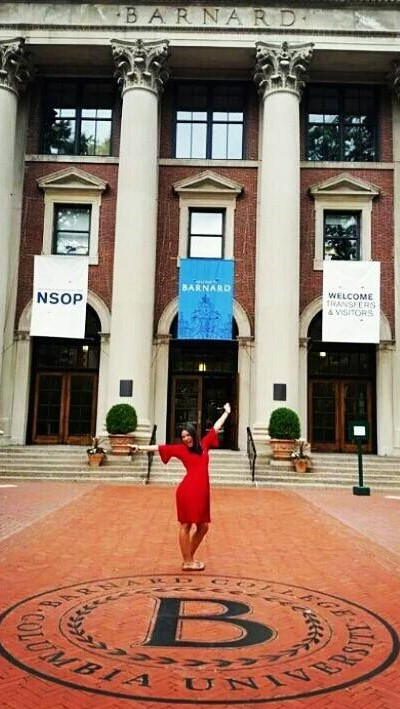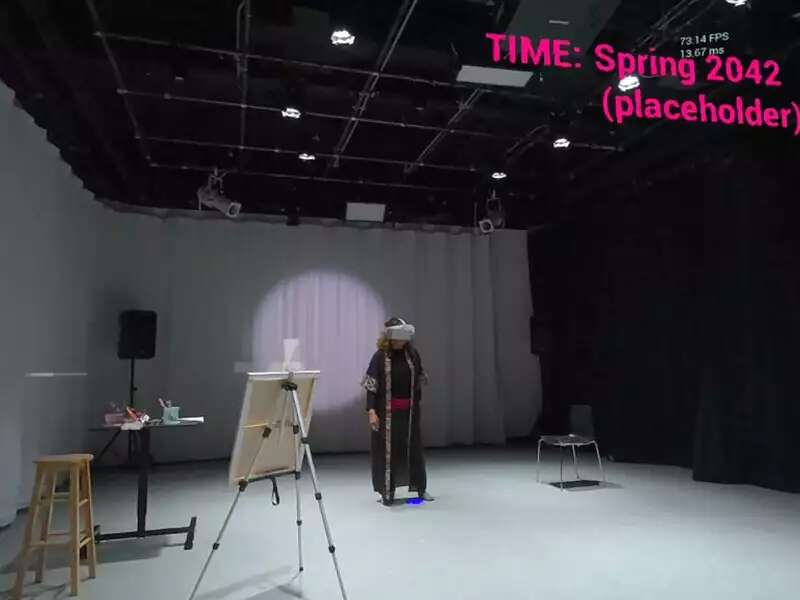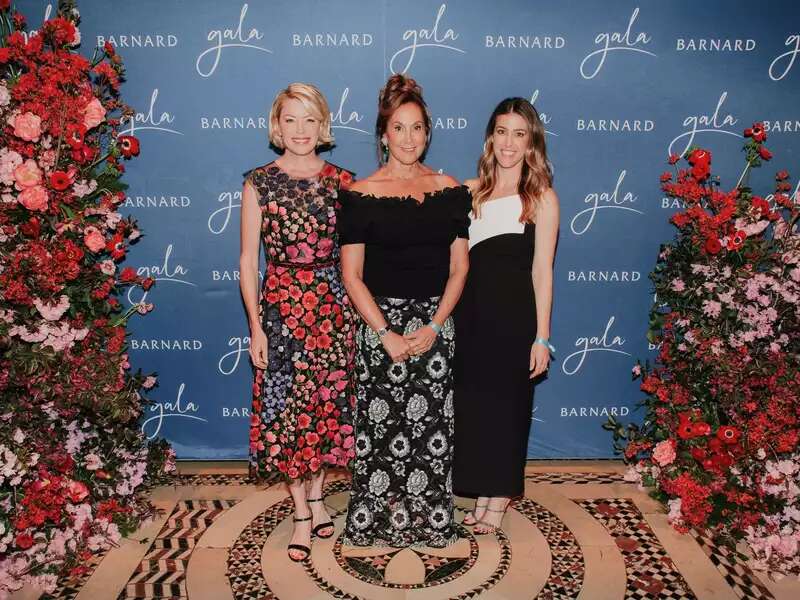Above: Vera (left) tables for Mujeres during Grupo Quisqueyano's Block Party during her time as a student at Barnard.
Tatiana Vera ’15 met Dr. Marie Miville, the vice dean for faculty affairs at Teachers College, when she was a senior at Barnard still figuring out what her next step was going to be.
“[Miville] deepened my understanding of the counseling psychology field, encouraging me to apply to my current doctorate program,” recalled Vera, who is now co-investigating and co-authoring the book Women and the Challenge of STEM Professions: Thriving in a Chilly Climate with Miville.
In addition to her work on the book, Vera is a student at Teachers College pursuing a doctorate in clinical, counseling, and applied psychology with a focus on Latinx mental health. In her research, Vera explores what Latina doctoral students in STEM need in terms of culturally based mentorship, with the goal of improving and increasing the retention of Latinas in STEM.
The doctorate is an extension of Vera’s time at Barnard, where she majored in psychology and minored in Spanish literature and cultures. Vera also revitalized the student group Mujeres while she was on campus, cultivating a community by organizing a leadership board, instituting biweekly meetings, and holding regular events.
“This experience reinforced the work that goes into leadership but also how rewarding it can be if you know it will serve others in a place where your community needs a community,” said Vera, who hopes her current work will extend that feeling of community to many more.
In a “5 Questions With…” interview conducted via email, Vera shares insights from her research, offers advice for Barnard students pursuing STEM, and celebrates her mentors.
What are some of the challenges women face in pursuing STEM careers?
In no particular order, some of the biggest challenges for women in STEM fields that Dr. Miville and I have found in the literature and within our study are:
Finding Support: Not having support systems outside and inside academic STEM fields proved highly detrimental. This support can include mentors, especially, and a network of peers to support them through really tough times. However, since there are already fewer women in STEM fields, finding this support can sometimes take a lot of work. Likewise, finding supportive life partners is also essential to ensure that women are not faced with the “baby penalty.”
“The Balance Challenge”: Women typically have more pressure than men to consider family planning. This has been attributed to the “baby penalty,” which can be particularly stressful in any academic setting where tenure demands and raising families occur at the same time.
Unhealthy Work Environments: This was a primary factor in why many women left their career tracks. An institution could be causing psychological harm if there is a lack of transparency and feedback, a sense that you are serving the institution at your own cost, a default to an assistant role, unequal workload, or your work is not appropriately accredited.
The Role of Self-Advocacy: A key quality that our participants also identified in successfully navigating STEM environments was self-advocacy. This was expressed in several different ways: as a personal quality that participants ascribed to themselves as critical in overcoming obstacles; as a reflection of their choice of work setting, in terms of ensuring the site was a good fit for participants; and as a driving force in seeking out support from others.
Structural and Systemic Barriers: An “old guard” mentality still overlays and acts as a structural barrier within STEM fields. Attention to career development for women in STEM is also under-researched, more so than career development for women in general. These issues are even more pressing if you are a Black or Indigenous woman of color or have other intersections of historically excluded identities.
How did Barnard give you the tools to pursue a doctorate in STEM?
Barnard gave me some of the friends who I consider family. As a Latina, family is essential. These are the folks I keep in contact with to this day as I pursue my degree.
I also appreciate Barnard for the different programs it allowed me to be involved in, like the Athena Leadership Scholars, the first-year Emerging Leaders Program, and the Collegiate Science and Technology Entry Program (CSTEP). Some programs gave me the confidence to argue with a professor on topics I disagreed with, while other programs gave me free resources that helped create a foundation for my academic and STEM pursuits.
But I think the most impactful way that Barnard allowed me to find my voice was through my work with Mujeres. [While working at Student Life], I was able to get in communication with Sugeni Perez ’01, the original founder of Mujeres in 1997, and [resurrect] what Mujeres’ original mission was. I found the original constitution and assembled a fantastic group of Latinx individuals at Barnard who shared a similar message of creating a space for Latinx/e-identifying folks at Barnard.
Higher education, especially STEM, can be lonely for folks of Latinx identities, especially with our shared views of familismo [dedication, commitment, and loyalty to family] and the need for connection. I felt that even with the fantastic resources that I had previously mentioned, social connections and support are the best things that I realized I could learn how to create despite being in historically white institutions.
What sparked your interest in Latinx mental health for your doctorate?
My research interests are a culmination of my identities and how I believe I have come to the point in my academic career that I am in now. I am a Latina, and I am a mentee and mentor. I am a researcher and academic scientist. From involvement in the Prep 9 program, my time at Choate Rosemary Hall, and different research experiences, it is difficult to pick a singular moment that sparked my interest in Latinx mental health.
For instance, upon meeting my mentor Dr. Angelica Perez, the previous CEO and founder of Latinas Think Big, we co-created and piloted the Ella Leadership Scholars workshop. I was proud of our steps to create supportive spaces for young Latinas to feel capable of pursuing educational opportunities through connection with professionally established Latinas. I realized the importance of educational introspection in the battle towards destigmatizing mental health engagement on a micro level — providing people with testimonials of others who look like them became a crucial first step in changing the stigma around mental health, and I wanted to continue this research after college in clinical spheres.
What advice do you have for Barnard students interested in pursuing scientific research?
Reach out to people. Join the organizations that give you the support you need, whether it connects you through a shared activity or cultural identity. I have been fortunate to find other Latinas in the field I want to enter, which differentiated my experience from others who may have also wanted to pursue STEM fields. Social media, specifically Twitter, became a massive resource while applying to graduate school programs and creating networks. I made friends with folks who founded organizations like Científico Latino, who again connected me with Latinx folks already in STEM Ph.D. programs. Virtual communities still count!
Also, the most fulfilling research is “me-search.” What is the research that directly affects your life? Are you interested in medicine because a family member had a terminal illness, or another issue you initially felt powerless to solve? Do you have a parent who suffers from anxiety and wants to understand it better? Or do you have a fun memory with friends and gaming that made you more interested in the background behind that? Use your childhood questions to facilitate your future directions.
Most importantly, I would advise Barnard students to live their lives outside of academia. Too often, [you could allow] these institutions [to] milk you dry for the sake of “experience” or later accolades.
Who are your STEM mentors?
The immediate women in my life who have changed it for the better are:
Dr. Marie Miville, for accepting me as her student after I unapologetically stalked her during different conferences and probably bothered her enough until she found it endearing and decided to work with me at the genesis of our co-authored book.
Dr. Patricia Arredondo, the first president of the National Latinx Psychological Association and one of the founders of counseling psychology as a whole. I had asked her for a letter of recommendation, and needless to say, I was stunned at her credentials. She is just that humble.
Dr. Angelica Perez-Litwin, for being the first Latina with a Ph.D. I ever met. She made that achievement and subsequent accolades look effortless to achieve for me. That is the importance of mentorships.




